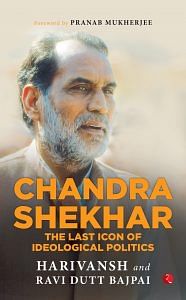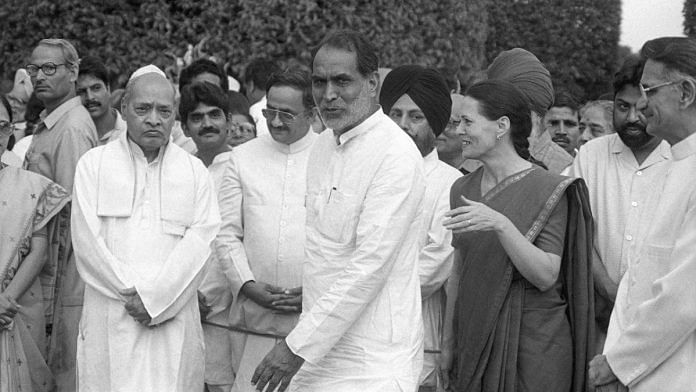After the general elections, an All India Congress Committee (AICC) session was held in June 1967 in New Delhi to examine the reasons behind the Congress’s dwindling electoral fortunes. After evaluating the election results, the finding was that ‘the slow and tardy progress towards the goal of socialism was the cause of the setback’. In this backdrop, Chandra Shekhar and his friends used the opportunity at the AICC session to pressurize the Congress leadership to take up progressive policies and push for drastic action to bring about fundamental, social and economic changes. Chandra Shekhar along with his other Praja Socialist Party (PSP) colleagues drafted the ten-point economic programme. The resolution on the ten-point programme stated that the AICC desired that the process of implementation of the programme towards the attainment of a socialist democratic society be accelerated. Chandra Shekhar and his socialist friends launched a signature campaign in which 118 Congress MPs appended their signature to the memorandum that was then submitted to the Party President Kamaraj and Prime Minister Indira Gandhi.
At this AICC session, some young radicals in the Congress formed a group that was nicknamed ‘Ginger Group’. It provided substantial support to Indira Gandhi against the Old Guards in the party. It was Chandra Shekhar and his ex-PSP associates who managed to revive the Ginger Group from being a non-controversial debating society into a robust and confrontational group that came to be popularly known as the ‘Young Turks’.
Chandra Shekhar challenged the status quo of the Congress on two fronts—how the party ruled the nation and how the party ruled itself—that led to massive internal churning within the party. Later, on the floor of the house, Chandra Shekhar levelled some serious allegations against Finance Minister Morarji Desai, claiming that Desai had altered some of his budgetary tax proposals to allow a Birla-owned aluminium company profit of around Rs 1.25 crore. Chandra Shekhar also alleged that Morarji’s tax concessions had allowed the Birla-owned Indian aluminium company’s expansion plan to benefit by Rs 2.5 crore. Morarji Desai rejected these charges and demanded disciplinary action against Chandra Shekhar and even threatened to retire from politics.
The executive committee of the Congress parliamentary party then authorized Indira Gandhi to discipline Chandra Shekhar because most people thought her to be lenient and tolerant of the attacks on Morarji Desai. During the escalating confrontation with Morarji Desai, Indira Gandhi had advised Chandra Shekhar to tender an apology and seek reconciliation with Desai and other senior Congress leaders. Indira Gandhi had been concerned that the senior Congress leaders would expel him from the party and she would not be able to prevent it. But Chandra Shekhar had refused, saying he was not an Indian housewife who was obliged to put up willy-nilly with her husband all her life.
Chandra Shekhar’s address at the Faridabad Congress session was the precursor to the emerging political scenario, a prelude to the internal power struggle in the Congress party, the split in the party and the changes in the policy orientation of the party’s rule.
The Young Turks were enthused after the Faridabad session and openly challenged the Congress party to bring about epochal changes. They demanded the nationalization of all the commercial banks, the abolition of princely privileges and the purging of the reactionary elements from the party. It seemed that the battle between the Old Guards and the Young Turks had reached its climax and both the sides were gearing themselves for a decisive showdown at the then upcoming AICC session at Bangalore on 10–12 July 1969.
The Young Turks and their other progressive allies decided to present an alternative economic programme in addition to the official party proposal of the economic policies. Therefore, on the eve of the Bangalore session, Chandra Shekhar and his friends submitted a memorandum, ‘An outline of national economic policies’, to the Congress high command, requesting this document to be included in the official resolution on the economic policy at the AICC meet.
Prime Minister Indira Gandhi also sent her own thoughts through Fakhruddin Ali Ahmed, called ‘A note on the economic policy’, to be presented on the first day of the Bangalore session, as she was indisposed. The next day, upon her arrival, the prime minister explained the note as ‘just some stray thoughts, rather hurriedly dictated’. It turned out that her stray thoughts were mostly drawn from the radical recommendations contained in the programme of the Young Turks (prepared mostly by Chandra Shekhar). These were policies that Chandra Shekhar had pursued from the early days of his political career and, finally, they had come to occupy the centre stage of the highest decision-making framework. The note by Indira Gandhi was called ‘a little more than a carbon copy of the paper prepared earlier by Chandra Shekhar and other Young Turks’. Indira Gandhi had already gained assurances from Kamaraj and Y.B. Chavan to support her proposal for bank nationalization — either to consider the nationalization of the top five commercial banks or to force the banks to spend a large chunk of their resources for public purposes. Her progressive economic agenda was seen as a weapon against the Syndicate, by challenging the old leaders on their policies. The battle lines between Indira Gandhi and the Syndicate were drawn based on proposed economic policies so that Indira Gandhi could portray her intra-party rivals as anti-progressive, status-quoists, self-serving and servile to certain corporate interests.
Y.B. Chavan worked out a compromise resolution on the economic programme put forward by the prime minister, and the AICC unanimously adopted Indira Gandhi’s ‘note’ without going into specific details of its implementation. Morarji and other Syndicate leaders like S.K. Patil and Nijalingappa were vehemently opposed to the proposal of bank nationalization. Moreover, Patil was also critical of the abolition of the privy purses. He considered them as moral obligations pledged by Sardar Patel and reneging on them would tarnish India’s image. Morarji Desai was indignant with the proposal and said, ‘As long as I am the finance minister, this cannot be implemented. If the prime minister wants to do it, she will have to change her finance minister.’ However, the Young Turks were elated and called the adoption of Indira Gandhi’s note by the AICC as a vindication of their stand. Chandra Shekhar commented that Indira Gandhi ‘should be congratulated for providing the right lead to the country. She had made bold and courageous suggestions and they should be welcomed by all’.
 This edited excerpt from Chandra Shekhar: The Last Icon of Ideological Politics has been published with permission from Rupa Publications.
This edited excerpt from Chandra Shekhar: The Last Icon of Ideological Politics has been published with permission from Rupa Publications.




Chandra Shekher’s policies have no relevance in today’s liberalised India welcoming global investments for which the current banking system is an answer. In fact the government of the day should strengthen the regulatory frame work of the RBI and its Independence which has become a milk cow for the current dispensation or any fund starved government whether it is BJP or Congress.
Thanks to all these ‘progressive ‘ India still remains a 3rd world poverty stricken country, with some of the lowest levels of human development indicators on the planet.
And how misguided he was about Bank nationalisation!
Our bankrupt Banks are result from this ” progressive policy”